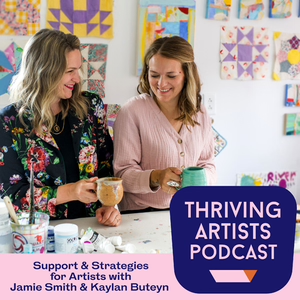
What can thousand-year-old trees teach us about living sustainably on this planet? - Highlights - DOUG LARSON
01/18/24 • 7 min
"There is no reason for doom and gloom in our species. Evolution has produced the most amazing organism that is capable of almost instantaneous change for the better. And I didn't know that when I was a kid, but I think I sensed it. I think I sensed that all these other 20 million species knew something we didn't know. And that was: there's always hope if you let it out of the bag. We're always willing to say that we're right to other people, but the joy comes from realizing that the truth eventually comes out. And it's by the inexorable floating of science to the surface, by people who are willing to say they're wrong. They think it's a sign of weakness, and in my view, it's the ultimate sign of strength in a politician to say, "Yeah, I was wrong last week. I was wrong last month. I was wrong last year." We're always looking for better ideas, and so if you've got one, let us know. Politicians think it's a sign of weakness to change their minds. And I think, are you kidding? Evolution is selecting for people to change their minds all the time. That's what works in nature. Evolution is the process by which things that are better replace things which aren’t."
What can thousand-year-old trees teach us about living sustainably? If we want to be sustained by this planet indefinitely, we need to stop trying to suck it dry.
Doug Larson is an award winning scientist, author, and Professor Emeritus of Biology at the University of Guelph. He is an expert on deforestation and regularly contributes to The Guardian and other publications. His books include Cliff Ecology: Pattern and Process in Cliff Ecosystems, The Urban Cliff Revolution: New Findings on the Origins and Evolution of Human Habitats, Storyteller Guitar, and The Dogma At My Homework.
https://experts.uoguelph.ca/doug-larson
https://volumesdirect.com/products/the-dogma-ate-my-homework
https://www.cambridge.org/core/books/cliff-ecology/7502E52B487789BEA2CACC4553AA663B
https://www.amazon.com/Urban-Cliff-Revolution-Evolution-Habitats/dp/1550419927
https://www.amazon.com/Storyteller-Guitar-Doug-Larson-ebook/dp/B00B9VZQXU
www.creativeprocess.info
www.oneplanetpodcast.org
IG www.instagram.com/creativeprocesspodcast
Image courtesy of Doug Larson
"There is no reason for doom and gloom in our species. Evolution has produced the most amazing organism that is capable of almost instantaneous change for the better. And I didn't know that when I was a kid, but I think I sensed it. I think I sensed that all these other 20 million species knew something we didn't know. And that was: there's always hope if you let it out of the bag. We're always willing to say that we're right to other people, but the joy comes from realizing that the truth eventually comes out. And it's by the inexorable floating of science to the surface, by people who are willing to say they're wrong. They think it's a sign of weakness, and in my view, it's the ultimate sign of strength in a politician to say, "Yeah, I was wrong last week. I was wrong last month. I was wrong last year." We're always looking for better ideas, and so if you've got one, let us know. Politicians think it's a sign of weakness to change their minds. And I think, are you kidding? Evolution is selecting for people to change their minds all the time. That's what works in nature. Evolution is the process by which things that are better replace things which aren’t."
What can thousand-year-old trees teach us about living sustainably? If we want to be sustained by this planet indefinitely, we need to stop trying to suck it dry.
Doug Larson is an award winning scientist, author, and Professor Emeritus of Biology at the University of Guelph. He is an expert on deforestation and regularly contributes to The Guardian and other publications. His books include Cliff Ecology: Pattern and Process in Cliff Ecosystems, The Urban Cliff Revolution: New Findings on the Origins and Evolution of Human Habitats, Storyteller Guitar, and The Dogma At My Homework.
https://experts.uoguelph.ca/doug-larson
https://volumesdirect.com/products/the-dogma-ate-my-homework
https://www.cambridge.org/core/books/cliff-ecology/7502E52B487789BEA2CACC4553AA663B
https://www.amazon.com/Urban-Cliff-Revolution-Evolution-Habitats/dp/1550419927
https://www.amazon.com/Storyteller-Guitar-Doug-Larson-ebook/dp/B00B9VZQXU
www.creativeprocess.info
www.oneplanetpodcast.org
IG www.instagram.com/creativeprocesspodcast
Image courtesy of Doug Larson
Previous Episode

DOUG LARSON - Biologist - Expert on Deforestation - Author of Cliff Ecology - The The Dogma Ate My Homework
What can thousand-year-old trees teach us about living sustainably? If we want to be sustained by this planet indefinitely, we need to stop trying to suck it dry.
Doug Larson is an award winning scientist, author, and Professor Emeritus of Biology at the University of Guelph. He is an expert on deforestation and regularly contributes to The Guardian and other publications. His books include Cliff Ecology: Pattern and Process in Cliff Ecosystems, The Urban Cliff Revolution: New Findings on the Origins and Evolution of Human Habitats, Storyteller Guitar, and The Dogma At My Homework.
"There is no reason for doom and gloom in our species. Evolution has produced the most amazing organism that is capable of almost instantaneous change for the better. And I didn't know that when I was a kid, but I think I sensed it. I think I sensed that all these other 20 million species knew something we didn't know. And that was: there's always hope if you let it out of the bag. We're always willing to say that we're right to other people, but the joy comes from realizing that the truth eventually comes out. And it's by the inexorable floating of science to the surface, by people who are willing to say they're wrong. They think it's a sign of weakness, and in my view, it's the ultimate sign of strength in a politician to say, "Yeah, I was wrong last week. I was wrong last month. I was wrong last year." We're always looking for better ideas, and so if you've got one, let us know. Politicians think it's a sign of weakness to change their minds. And I think, are you kidding? Evolution is selecting for people to change their minds all the time. That's what works in nature. Evolution is the process by which things that are better replace things which aren’t."
https://experts.uoguelph.ca/doug-larson
https://volumesdirect.com/products/the-dogma-ate-my-homework
https://www.cambridge.org/core/books/cliff-ecology/7502E52B487789BEA2CACC4553AA663B
https://www.amazon.com/Urban-Cliff-Revolution-Evolution-Habitats/dp/1550419927
https://www.amazon.com/Storyteller-Guitar-Doug-Larson-ebook/dp/B00B9VZQXU
www.creativeprocess.info
www.oneplanetpodcast.org
IG www.instagram.com/creativeprocesspodcast
Image courtesy of Doug Larson
Next Episode

Artists, Activists & Anarchists Seize Wetlands from the French Republic: We Learn How
In this episode on Speaking Out of Place podcast, Professor David Palumbo-Liu and Azeezah Kanji talk with artists and activists Isabella Frémaux and Jay Jordan about their book, We are ‘Nature’ Defending Itself: Entangling Art, Activism and Autonomous Zones Vagabonds/Pluto/Journal of Aesthetics & Protest, 2021. They tell the story of a 40-year struggle to preserve 4,000 acres of wetlands from being destroyed to make way for an airport, but the book is also a profound and beautiful meditation on what it means to live together and struggle together outside the logic of capitalist extraction and violence.
Jay (formerly John) Jordan (they/them) is labelled a "Domestic Extremist" by the police, and “a magician of rebellion” by the press. Part-time author, sex worker and full time trouble maker, Jay is a lover of edges, especially between art and activism. They co-founded Reclaim the streets and the clown army.
Isabelle Fremeaux (she/her) is a popular educator, facilitator, action researcher and deserter of the neoliberal academy where for a decade she was Senior Lecturer at Birkbeck College London. Co-author (with Jay) of the film/book Les Sentiers de L’utopie (2011, La Découverte), together they coordinate The Laboratory of Insurrectionary Imagination, bringing artists and activists together to co-design and deploy tools of disobedience. They live on the zad of Notre-dame-des-landes, a territory “lost to the Republic,” according to the French government.
https://labo.zone/index.php/we-are-nature-defending-itself-entangling-art-activism-autonomous-zones/?lang=en
www.labo.zone
https://www.theguardian.com/uk/2009/oct/27/police-spotter-card-john-jordan
https://en.wikipedia.org/wiki/Reclaim_the_Streets
www.palumbo-liu.com
https://speakingoutofplace.com
https://twitter.com/palumboliu?s=20
www.instagram.com/speaking_out_of_place
If you like this episode you’ll love
Episode Comments
Generate a badge
Get a badge for your website that links back to this episode
<a href="https://goodpods.com/podcasts/books-and-writers-the-creative-process-novelists-screenwriters-playwri-218043/what-can-thousand-year-old-trees-teach-us-about-living-sustainably-on-42305440"> <img src="https://storage.googleapis.com/goodpods-images-bucket/badges/generic-badge-1.svg" alt="listen to what can thousand-year-old trees teach us about living sustainably on this planet? - highlights - doug larson on goodpods" style="width: 225px" /> </a>
Copy




